Contents
Market Overview
Macro Review
FOMC minutes reveal the Fed is “thinking about thinking” about tapering. The tapering calendar has shifted expectations of an announcement from Jackson Hole to the June FOMC. It is likely that any decision will hinge on the June NFP, therefore it is still not a foregone conclusion. Equally, the composition of tapering has shifted to reducing MBS purchases ($40bn/month) at a more rapid pace over U.S. Treasuries ($80bn/month), which is an idea originally proposed by Rosengren that Bullard has subsequently bought into. While U.S. Treasury auctions had been more supportive in recent months, the weak 10yr TIPS auction created an initial pause for concern, although markets were more focused on commodity weakness and the impact of declining inflation expectations (5y5y tightened 16bp this week). However, cryptocurrency volatility stole most of the headlines this week (Bitcoin -17% and Ethereum -28%). Elsewhere, Israel announced a 14-day ceasefire with Hamas over tensions in Gaza, although U.S. breakthrough talks with Iran and reestablishing the JCPOA could threaten regional stability. The move to allow Iran to return to the oil market sent brent from $70/bbl down to $64/bbl. However, the commodity weakness persisted through the week and across base metals. Copper ended the week down 2.7%, albeit still above $10k/t, though iron ore was down 7.4% after declining 10.8% the previous week.
EM Credit Update
EM Credit ended the week up 0.1% as spreads moved 1bp wider as U.S. Treasuries were relatively subdued. Zambia, Tunisia and Argentina outperformed, while Ethiopia, Papua New Guinea and El Salvador lagged. Two key trends are developing: EM Corporates are outperforming EM Sovereigns, and EM is outperforming DM substantially through May (U.S. HY is 16bp wider, while EM HY is 7bp tighter).
The Week Ahead
Key events next week rest with central bank decisions from Indonesia, South Korea and New Zealand. The relevance of New Zealand is the likelihood of accelerated tapering, following the Bank of Canada and Bank of England. Bank Indonesia remains stuck in a policy bind with rates expected to be held at 3.5%, with other decisions from Ghana (14.5%) Hungary (0.6%), Kenya (7.0%) and Nigeria (11.5%). China’s release of industrial profits may also be a telegraphed event after some softness in inflation, industrial production and retail sales over the past month.
This week’s emerging markets highlights discussed below include: Colombia loses investment grade (IG) from first rating agency; Manageable governability prospects at the start of Lasso’s Presidency in Ecuador; Crushing defeat for Chile’s political establishment in Constituent Assembly elections; Global emerging markets corporates in focus: Lessons from Privatbank.
Fixed Income
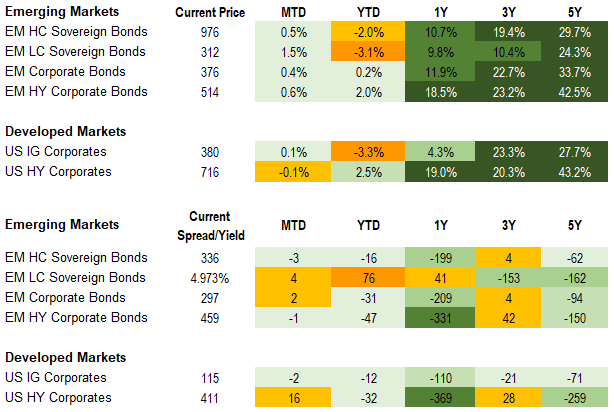
Equities
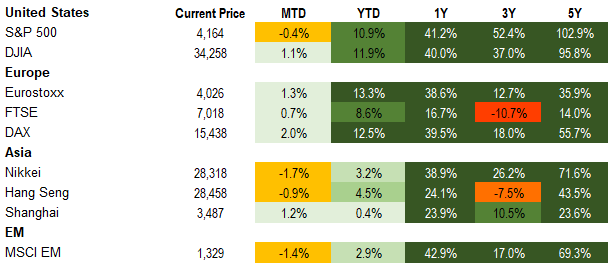
Commodities

Source for data tables: Bloomberg, JPMorgan, Gramercy. EM Fixed Income is represented by the following JPMorgan Indicies: EMBI Global, GBI-EM Global Diversified, CEMBI Broad Diversified and CEMBI Broad High Yield. DM Fixed Income is represented by the JPMorgan JULI Total Return Index and Domestic High Yield Index. Fixed Income, Equity and Commodity data is as of May 21, 2021 (Mid Afternoon).
Emerging Markets Weekly Highlights
Colombia loses investment grade (IG) from first rating agency
Event: This week Standard & Poor’s (S&P) downgraded Colombia’s foreign currency long-term debt sovereign rating to BB+ with a Stable outlook, from BBB-/Negative.
Gramercy Commentary: The timing of S&P’s decision came as a surprise to markets given that the agency had just affirmed Colombia’s BBB- sovereign rating with a Negative outlook back in late April. However, the recent social turmoil following a withdrawn tax reform proposal by the authorities appears to have swayed the agency toward a downgrade to HY, mostly on concerns about diminished fiscal reform prospects. With S&P’s downgrade out of the way, investors’ attention will now focus very closely on what Fitch, the other agency that rates Colombia at the cusp of IG with a negative outlook, will do next. For context, Fitch was considered by the market as the most likely “first mover” on Colombia and we think there is a good chance that it might follow S&P in cutting the sovereign rating to HY by the end of the year. If Colombia loses its IG status from two of the three major rating agencies, it will officially join the club of so-called “fallen angel” sovereigns, the first one to do so in the post-pandemic environment. Such a scenario will raise the issues of “forced selling” by funds that are prohibited from holding sub-IG risk and can generate outflows from Colombian assets. However, estimates by major trading houses point to $1-3bn range of potential selling pressure by passive and active funds. This would be relatively manageable in our view and there is significant uncertainty around the size and timing of active outflows. Forced selling in the local currency space is not a concern, at least for now, given that S&P continues to rate Colombia’s local currency long-term debt as IG (BBB-/Stable). In general, there could be a “silver lining” for markets in S&P’s earlier-than-expected downgrade, to the extent that losing its coveted IG rating from one agency provides an additional impetus and political cover for the government to pass fiscal reforms and potentially avoid seeing the rating lowered by another agency (i.e. Fitch).
Manageable governability prospects at the start of Lasso’s Presidency in Ecuador
Event: As the newly elected National Assembly assumed office last weekend, President-elect Lasso’s center-right party (CREO) reached a legislative alliance with the indigenous movement Pachakutik (PK), center-left Izquierda Democratica (ID) and some independents.
Gramercy Commentary: As it stands, Lasso’s block will control a bit over 50% of the 137 seats in the Assembly. The coalition is ideologically heterogeneous and any major reforms will still require building ad-hoc political alliances, but we believe the latest developments point to a relatively smooth start for Lasso’s Administration in terms of governability prospects. Since Lasso’s surprising win over Arauz in the April Presidential run-off, one of the key risks to Ecuador’s impressive market performance has been the issue of “governability” given the fragmented nature of the new Assembly and the small share controlled by Lasso’s own party. A lack of governability would hinder Lasso’s ability to implement economic policy and deliver on IMF conditionality, i.e. the two most important market drivers. In our view, the coalition formed last weekend bodes well for governability, at least in the near term, supporting the sovereign bond outlook. The leftist flavor of Lasso’s coalition partners means that the Administration will need to move firmly and more openly to the center on economic policy, but we think there are a number of IMF-supported reforms and measures that markets will like and the government can pass in the current configuration. In addition, a scenario that markets would not have liked, one in which Lasso formed a legislative alliance with the Correista opposition, was avoided.
Crushing defeat for Chile’s political establishment in Constituent Assembly elections
Event: Center-right and center-left establishment parties suffered a heavy defeat in Chile’s Constituent Assembly elections last weekend. Leftist and left-leaning independent candidates made big gains at the establishment’s expense and will have the upper hand in the special legislative body that will be re-writing Chile’s constitution, a key demand of the massive street protests of late 2019.
Gramercy Commentary: Conservative and centrist forces failed to capture the 1/3 of 155 seats needed for a blocking veto, opening the door for more radical changes to the constitution. Depending on how the new constitution-drafting process unfolds and what changes make it into the new framework, Chile’s macroeconomic environment could experience a meaningful evolution over the medium-term (2-3 years). From a market point of view, one of Chile’s key credit strengths has been a long track-record of fiscal prudence and conservative economic policy. Against a backdrop of strong demand by the population for expanding the role of the state by providing broader/stronger safety nets and addressing persistent economic inequality/inequity, it is very likely that Chile’s fiscal strength will continue to erode even after the COVID-19 effects are behind us. This being said, Chile entered the recent crisis period as one of the fundamentally strongest EM credits, so the sovereign still has significant space to absorb a deterioration in its credit metrics without suffering too significant of a credit quality migration in the next few years, in our view.
Global emerging markets corporates in focus: Lessons from Privatbank
Event: The Bank of England has decided to recognize the bail-in of four Privatbank loans totaling $595mm. These loans were funded by senior and subordinated securities issued by UK SPV Credit Finance plc and governed by English law. Privatbank was nationalized in 2016. The bail-in of the four securities took place at that time. The National Bank of Ukraine requested recognition of the bail-in shortly after that.
Gramercy Commentary: For Ukraine’s authorities, the Bank of England (BoE) decision means a potential saving of $565mm in principal payments and as-yet-undetermined past-due interest on the Privatbank securities. This remains only a potential saving while investors are still able to seek repayment through the courts. There are broader implications of the BoE decision, however. In its determination, the BoE made reference to the Financial Stability Board’s (FSB) Key Attributes of Effective Resolution Regimes for Financial Institutions. Resolution authorities may have very broad powers, including powers to carry out bail-ins. There are safeguards – the hierarchy of claims should be respected, no creditor should be worse off than in a liquidation and directors and officers of the firm under resolution should be protected in law. Members of the FSB include authorities in the U.S. and UK, and in emerging markets Brazil, China, Russia and Turkey. Ukraine is not listed as a member. Recognition of Ukraine’s resolution action by the Bank of England may set a precedent for authorities in other countries which are not members of the FSB seeking recognition of similar actions on securities with no contractual loss absorption language which were issued under English Law. Application of the FSB’s key attributes may be much broader than the board’s member list suggests. The BoE decision in the Privatbank case may serve as yet more proof (not that this was needed) that government intervention may not always be positive for investors in emerging market banks. Having said all this, with legal remedies still available, it is not yet clear whether bondholders or Privatbank will prevail in the end. Possible implications of the eventual outcome on other emerging markets means the Privatbank case remains one to watch.
Emerging Markets Technicals
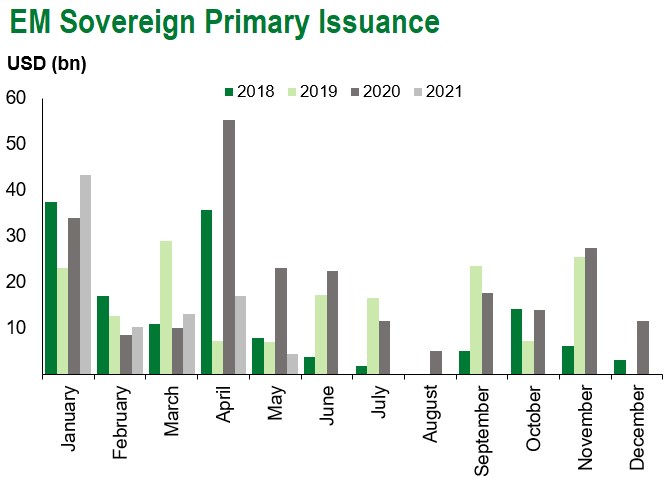
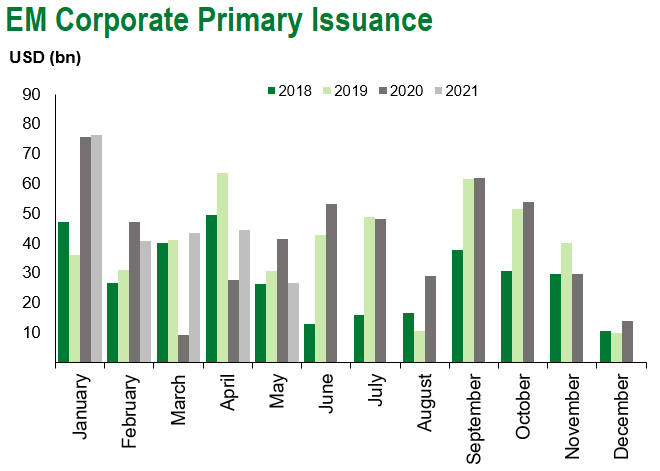
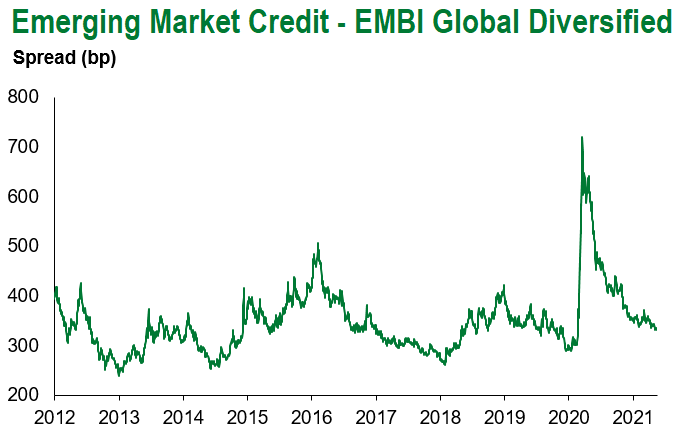
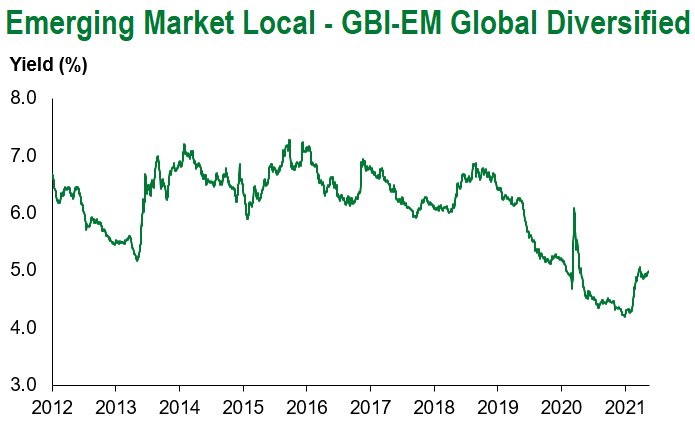
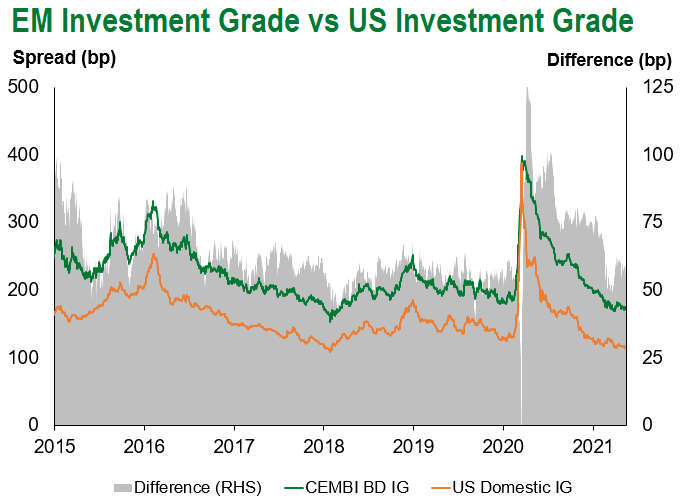
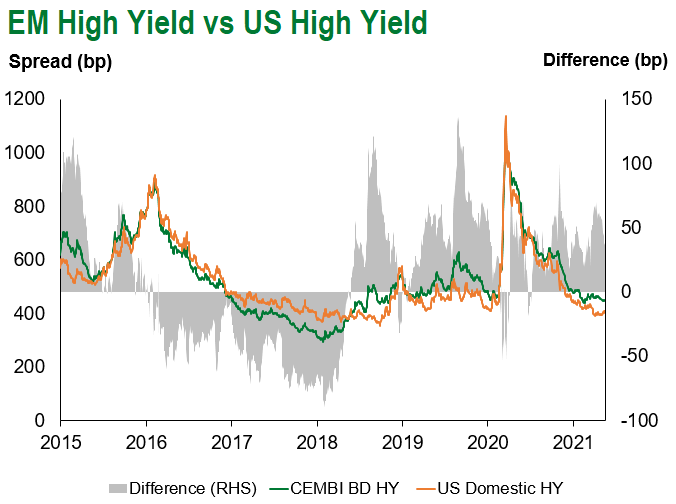
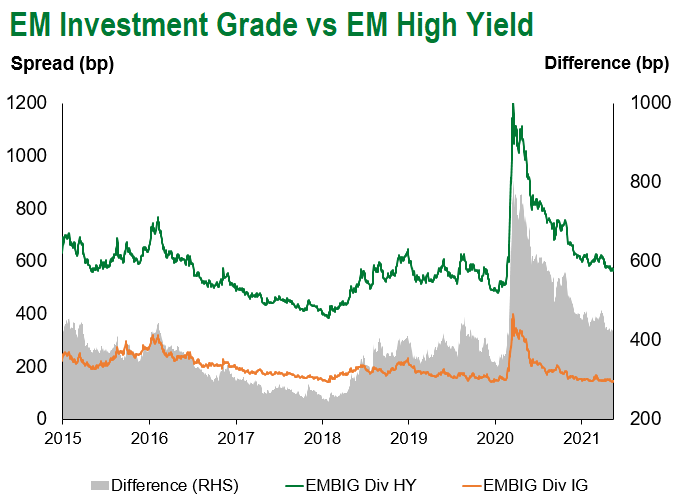
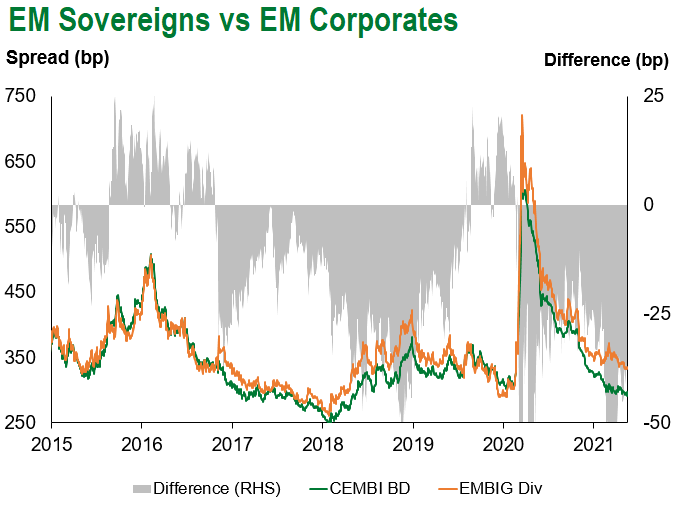
Emerging Markets Flows
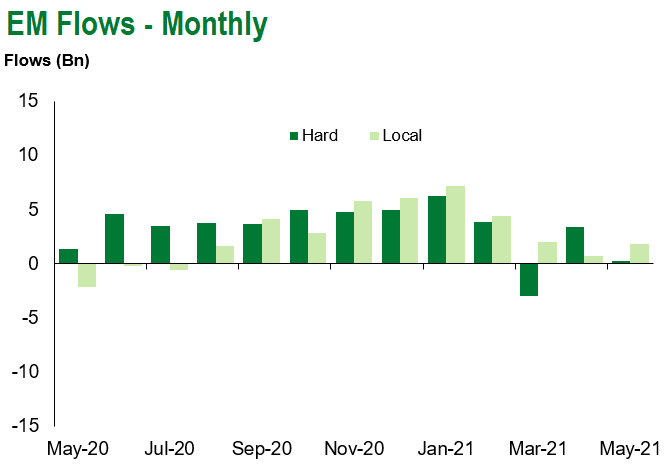
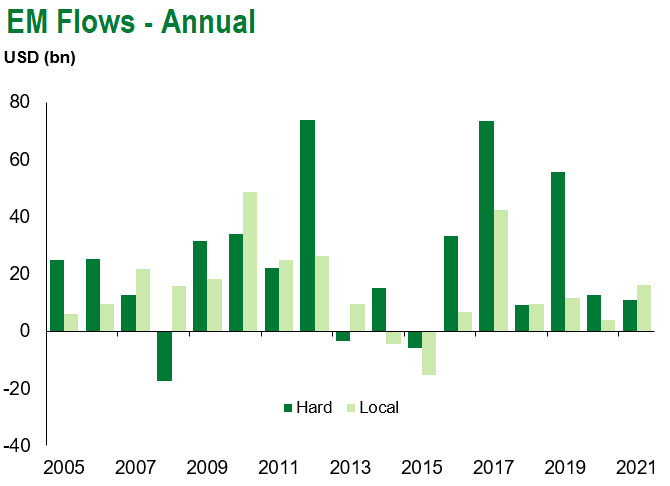
Source for graphs: Bloomberg, JPMorgan, Gramercy. As of May 21, 2021.
COVID Resources
Emerging Markets COVID-19 Case Summary
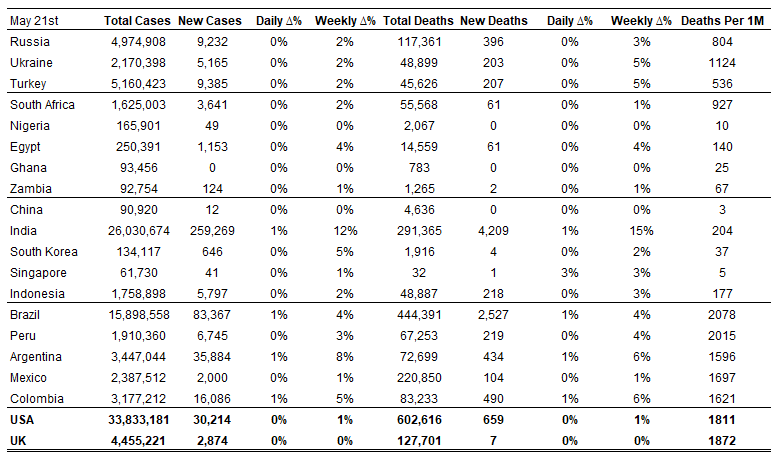
Source: Worldometer as of May 21, 2021.
Additional Crisis Resources:
Johns Hopkins COVID-19 Case Tracker
For questions, please contact:
Kathryn Exum, Senior Vice President, Sovereign Research Analyst, [email protected]
Petar Atanasov, Senior Vice President, Sovereign Research Analyst, [email protected]
Tolu Alamutu, CFA, Senior Vice President, Corporate Research Analyst, [email protected]
James Barry, Vice President, Corporate Research Analyst, [email protected]
This document is for informational purposes only. The information presented is not intended to be relied upon as a forecast, research or investment advice, and is not a recommendation, offer or solicitation to buy or sell any securities or to adopt any investment strategy. Gramercy may have current investment positions in the securities or sovereigns mentioned above. The information and opinions contained in this paper are as of the date of initial publication, derived from proprietary and nonproprietary sources deemed by Gramercy to be reliable, are not necessarily all-inclusive and are not guaranteed as to accuracy. This paper may contain “forward-looking” information that is not purely historical in nature. Such information may include, among other things, projections and forecasts. There is no guarantee that any forecasts made will come to pass. Reliance upon information in this paper is at the sole discretion of the reader. You should not rely on this presentation as the basis upon which to make an investment decision. Investment involves risk. There can be no assurance that investment objectives will be achieved. Investors must be prepared to bear the risk of a total loss of their investment. These risks are often heightened for investments in emerging/developing markets or smaller capital markets. International investing involves risks, including risks related to foreign currency, limited liquidity, less government regulation, and the possibility of substantial volatility due to adverse political, economic or other developments. The information provided herein is neither tax nor legal advice. Investors should speak to their tax professional for specific information regarding their tax situation.